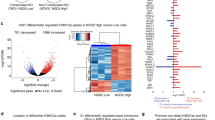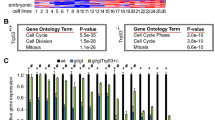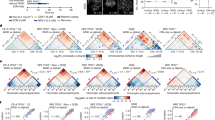Abstract
The mSin3 corepressor complex has been linked to diverse cancer signaling pathways through its capacity to regulate target gene expression via chromatin modification. mSds3, a cell essential gene, is a key component of the mSin3 complex serving to maintain its inherent histone deacetylase activity. mSds3 also serves an essential role in the establishment of pericentric heterochromatin, and genetic ablation of mSds3 results in chromosome missegregation. In contrast, mSin3A nullizygous cells show normal chromosome dynamics and cytogenetic profiles. The integral role of mSds3 in controlling chromosome segregation and mSin3-regulated transcriptional networks prompted efforts to determine the neoplastic impact of loss of one copy of mSds3 or mSin3A. In particular, we assessed whether loss of one copy of mSds3, alone or in combination with p53 mutation, results in aneuploidy and promotes a cancer-prone condition in the mouse. We observe that, in a p53 null background, loss of one mSds3 allele results in accelerated tumor onset and increased tumor burden. Notably, these mSds3+/− p53−/− tumors exhibit a more complex cytogenetic profile characterized by marked aneuploidy and centromeric associations. The presence of even one copy of p53 is sufficient to suppress the accelerated tumorigenesis in mSds3+/− mice, consistent with a key role for p53 in monitoring mitotic fidelity. These observations with Sds3 mutant mice contrast with mSin3A+/− p53−/− mice, which do not show an accelerated or increased tumor incidence relative to mSin3A+/+p53−/− controls, correlating with the absence of aneuploidy detected upon mSin3A genetic inactivation. This genetic study establishes that the capacity of mSds3 to cooperate with p53 deficiency in cancer predisposition relates to its specific role in chromosome segregation, rather than its central role in maintaining a functional mSin3A complex.
This is a preview of subscription content, access via your institution
Access options
Subscribe to this journal
Receive 50 print issues and online access
$259.00 per year
only $5.18 per issue
Buy this article
- Purchase on Springer Link
- Instant access to full article PDF
Prices may be subject to local taxes which are calculated during checkout




Similar content being viewed by others
References
Alland L, David G, Shen-Li H, Potes J, Muhle R, Lee HC et al. (2002). Mol Cell Biol 22: 2743–2750.
Artandi SE, DePinho RA . (2000). Curr Opin Genet Dev 10: 39–46.
Bassing CH, Suh H, Ferguson DO, Chua KF, Manis J, Eckersdorff M et al. (2003). Cell 114: 359–370.
Bunz F, Fauth C, Speicher MR, Dutriaux A, Sedivy JM, Kinzler KW et al. (2002). Cancer Res 62: 1129–1133.
Chin L, Artandi SE, Shen Q, Tam A, Lee SL, Gottlieb GJ et al. (1999). Cell 97: 527–538.
Cowley SM, Iritani BM, Mendrysa SM, Xu T, Cheng PF, Yada J et al. (2005). Mol Cell Biol 25: 6990–7004.
Dannenberg JH, David G, Zhong S, van der Torre J, Wong WH, Depinho RA . (2005). Genes Dev 19: 1581–1595.
David G, Turner GM, Yao Y, Protopopov A, DePinho RA . (2003). Genes Dev 17: 2396–2405.
Dorland S, Deegenaars ML, Stillman DJ . (2000). Genetics 154: 573–586.
Fleischer TC, Yun UJ, Ayer DE . (2003). Mol Cell Biol 23: 3456–3467.
Fujiwara T, Bandi M, Nitta M, Ivanova EV, Bronson RT, Pellman D . (2005). Nature 437: 1043–1047.
Gu W, Roeder RG . (1997). Cell 90: 595–606.
Insinga A, Monestiroli S, Ronzoni S, Carbone R, Pearson M, Pruneri G et al. (2004). EMBO J 23: 1144–1154.
Ito A, Lai CH, Zhao X, Saito S, Hamilton MH, Appella E et al. (2001). EMBO J 20: 1331–1340.
Jacks T, Remington L, Williams BO, Schmitt EM, Halachmi S, Bronson RT et al. (1994). Curr Biol 4: 1–7.
Kalitsis P, Fowler KJ, Griffiths B, Earle E, Chow CW, Jamsen K et al. (2005). Genes Chromosomes Cancer 44: 29–36.
Kuzmichev A, Zhang Y, Erdjument-Bromage H, Tempst P, Reinberg D . (2002). Mol Cell Biol 22: 835–848.
Lechner T, Carrozza MJ, Yu Y, Grant PA, Eberharter A, Vannier D et al. (2000). J Biol Chem 275: 40961–40966.
Luo J, Su F, Chen D, Shiloh A, Gu W . (2000). Nature 408: 377–381.
Marks PA, Richon VM, Miller T, Kelly WK . (2004). Adv Cancer Res 91: 137–168.
Maser RS, DePinho RA . (2003). Cancer Cell 3: 4–6.
Rajagopalan H, Lengauer C . (2004). Nature 432: 338–341.
Sakaguchi K, Herrera JE, Saito S, Miki T, Bustin M, Vassilev A et al. (1998). Genes Dev 12: 2831–2841.
Santarosa M, Ashworth A . (2004). Biochim Biophys Acta 1654: 105–122.
Venkatachalam S, Shi YP, Jones SN, Vogel H, Bradley A, Pinkel D et al. (1998). EMBO J 17: 4657–4667.
Xin H, Yoon HG, Singh PB, Wong J, Qin J . (2004). J Biol Chem 279: 9539–9546.
Acknowledgements
We thank Alice Yu for the colony monitoring. We are grateful to Alexei Protopopov for his advice and insight on chromosomal analysis. Isabelle Marie and Lawrence Gardner are acknowledged for helpful discussion. RAD is an American Cancer Society Research Professor and an Ellison Medical Foundation Senior Scholar. This work was supported by the National Institute of Health (RO1CA86379), The American Cancer Society (RAD), New York University School of Medicine (GD, Robert A. and Renee E. Belfer Foundation Institute for Innovative Cancer Science), the Damon-Runyon Cancer Research Foundation and the Dutch Cancer Society (JHD). NS is supported by an NIH pre-doctoral Training Grant.
Author information
Authors and Affiliations
Corresponding author
Additional information
Supplementary Information accompanies the paper on the Oncogene website (http://www.nature.com/onc).
Supplementary information
Rights and permissions
About this article
Cite this article
David, G., Dannenberg, JH., Simpson, N. et al. Haploinsufficiency of the mSds3 chromatin regulator promotes chromosomal instability and cancer only upon complete neutralization of p53. Oncogene 25, 7354–7360 (2006). https://doi.org/10.1038/sj.onc.1209734
Received:
Revised:
Accepted:
Published:
Issue Date:
DOI: https://doi.org/10.1038/sj.onc.1209734
Keywords
This article is cited by
-
Cancer-associated alteration of pericentromeric heterochromatin may contribute to chromosome instability
Oncogene (2012)
-
Metastasis suppression by BRMS1 associated with SIN3 chromatin remodeling complexes
Cancer and Metastasis Reviews (2012)
-
Classification of colorectal carcinoma obtained from the combination of DNA ploidy and genetic alterations serves as a significant prognostic factor
Journal of Gastroenterology (2009)



